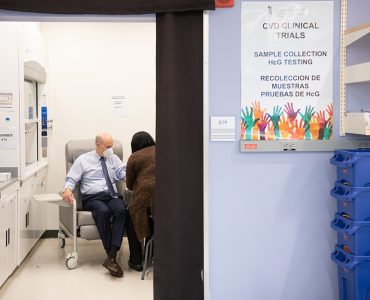
Over the past two decades, opioid overdose deaths in the United States have surged by more than 435 percent. In Maryland, the overdose death rate has more than doubled since 2015 — accounting for 5 percent of all deaths in the state. In 2020 alone, Baltimore saw 964 deaths attributed to opioid overdose, which was nearly triple the number of deaths from homicide.
While the death rate from opioid overdoses continues to rise, deaths and disability from infections related to IV opioid drug use add to this devastation.
People who inject drugs have an increased risk of contracting infections, including local injection-related infections and serious infections like bacteremia (blood infections) or endocarditis (heart infection), which can be life-threatening.
To improve health outcomes in people who inject opioid drugs and are hospitalized with infectious complications of their drug use, the University of Maryland School of Medicine (UMSOM) has received a $29 million research award over four years from the National Institutes of Health (NIH) to lead a multicenter trial. Faculty affiliated with the Institute of Human Virology and the Kahlert Institute for Addiction Medicine at UMSOM will be conducting the research.
“Our current research demonstrated that patients with substance use disorder hospitalized for infectious complications are prone to have negative outcomes. There is a limited understanding of what interventions can best improve outcomes in people who use drugs, especially in the vulnerable time period after hospitalization,” said Sarah Kattakuzhy, MD, MPH, co-principal investigator and associate director of the Kahlert Institute. “This investigation will test multiple interventions to improve outcomes in this vulnerable population.”
The research award, which has provided $8.7 million in funding for the first year, is funded by the NIH’s Helping to End Addiction Long-term Initiative (NIH HEAL Initiative) for the implementation of the Continuum of Care in Hospitalized Patients with Opioid Use Disorder and Infectious Complications of Drug Use (CHOICE) investigation. Principal IHV investigators are Kattakuzhy, associate professor of medicine at UMSOM; Elana Rosenthal, MD, associate professor of medicine at UMSOM; and Edward Traver, MD, assistant professor of medicine at UMSOM.
Critical Part of UMSOM’s Mission
In addition to the CHOICE study, UMSOM has made it a critical part of its mission to drive innovation in the field of addiction medicine. Last year, the school opened the Kahlert Institute for Addiction Medicine.
“Those who use illicit IV drugs are up to 50 times more likely to be admitted to the hospital for a bacterial infection compared to patients in the general population,” said UMSOM Dean Mark T. Gladwin, MD, the John Z. and Akiko K. Bowers Distinguished Professor, UMSOM, and vice president for medical affairs, University of Maryland, Baltimore. “The landmark CHOICE research study aims to prevent these life-threatening infections by identifying and overcoming specific barriers to care for these high-risk patients. This aligns with the efforts of the Kahlert Institute to identify and implement the best evidence-based harm reduction measures that minimize the negative consequences of drug use on a patient’s overall health.”
CHOICE, led by the IHV’s Research Initiative on Infectious Disease and Substance Use, will aim to recruit about 700 patients over three years from the University of Maryland Medical Center and hospitals affiliated with Emory University, George Washington University, and West Virginia University. Any patients admitted to the hospital for infections related to intravenous drug use potentially could be eligible to enroll in the study.
“Taking care of people who use drugs and have serious infection is complicated,” said Traver, the co-investigator who leads the Maryland site. “The CHOICE study is being conducted at four large academic health centers in the United States, all encountering the challenges of the opioid epidemic and associated infections. We are hoping to leverage their vast experience to further improve our care using a novel site-specific intervention-based study design.”
‘An Unmet Need’
It is crucial to gain a comprehensive understanding of the effects of interventions aimed at addressing opioid use disorder throughout a patient’s entire care journey, encompassing their initial hospitalization and the period following discharge. The knowledge gained from CHOICE is vital for enhancing the long-term well-being of people who inject drugs.
“This program draws on more than a decade of experience that this team has had in Washington, D.C., and Baltimore, developing both innovation and implementation strategies to reduce the burden of two major pandemics — HIV and opioid use disorder — in urban America,” said Henry Masur, MD, chief, Critical Care Medicine Department at the NIH Clinical Care Center in Bethesda, Md. “This UMSOM multicenter project will develop important information to inform public health policies for dealing with substance use disorder and on HIV.”
The research team has spent the past several months conducting a needs assessment to determine the design of a randomized clinical trial that will test interventions to identify which work best to prevent re-hospitalizations for infectious diseases related to IV drug use. Interventions likely will include a combination of improving access to primary care services, better care coordination, and providing easier access to opioid use disorder medications like methadone and buprenorphine. They also will include harm-reduction techniques like access to sterilized needles.
“The status quo is not meeting the needs of these patients, who have incredibly high rates of morbidity and mortality,” Rosenthal said. “This study will address an unmet need that our research uncovered, and we are hopeful will improve the outcomes of patients we see hospitalized with infectious complications of injecting opioids.”



